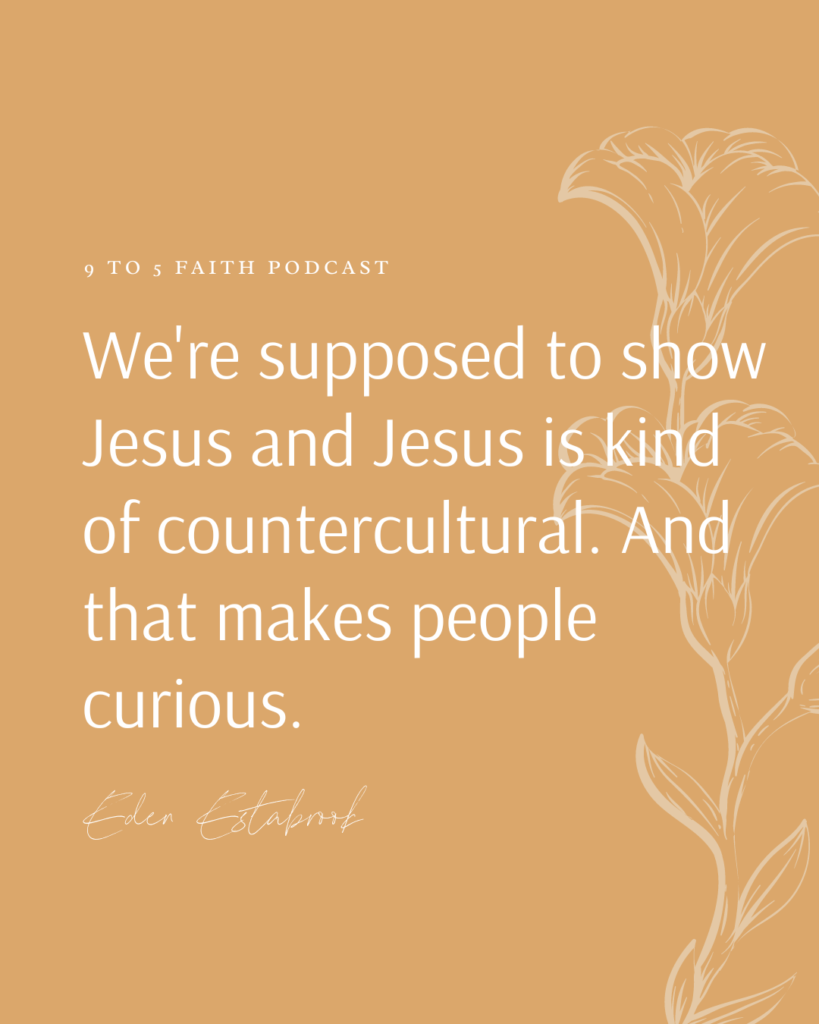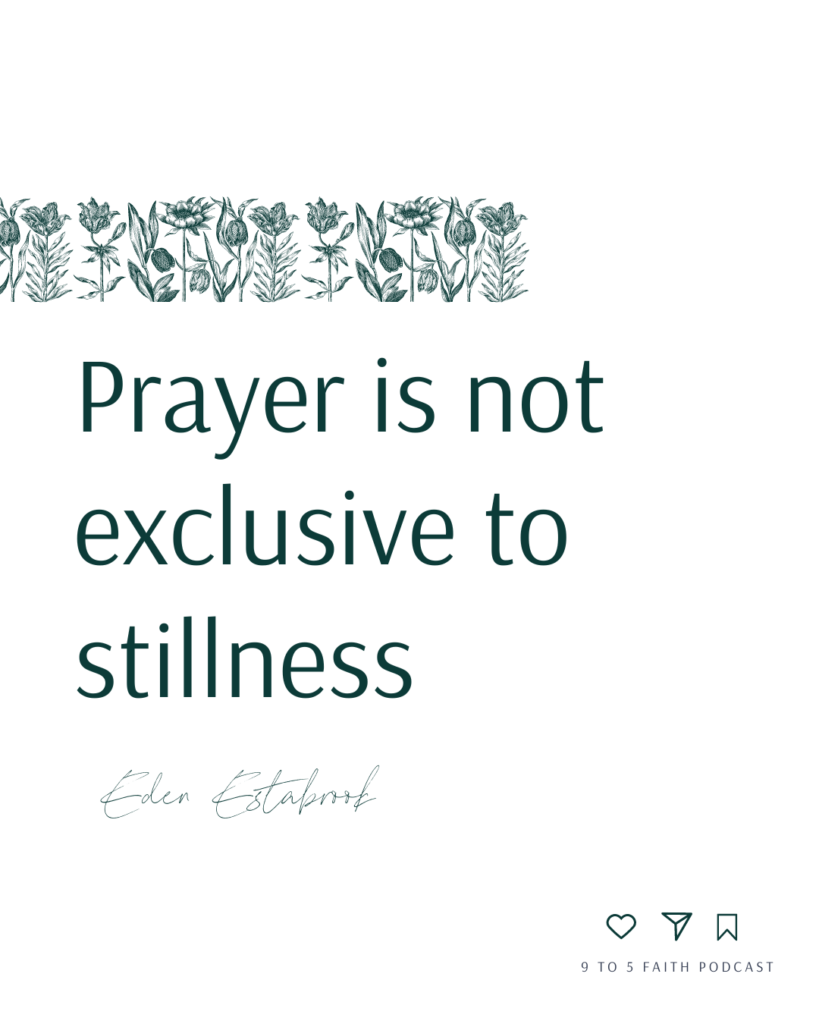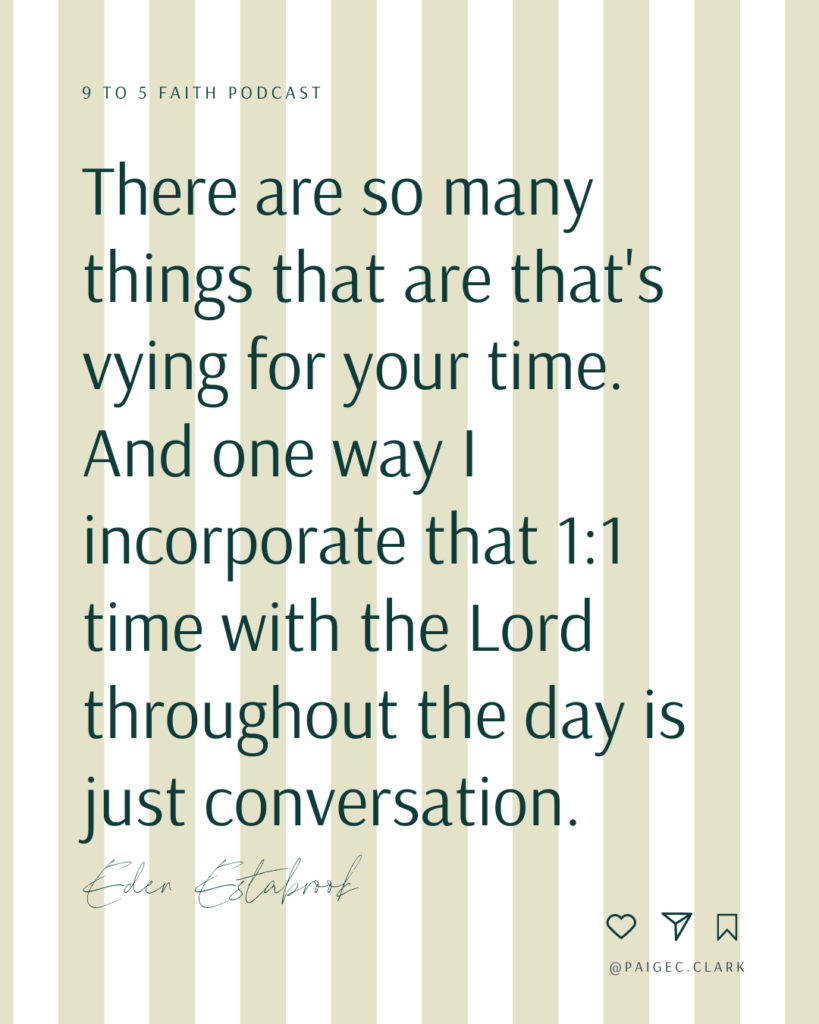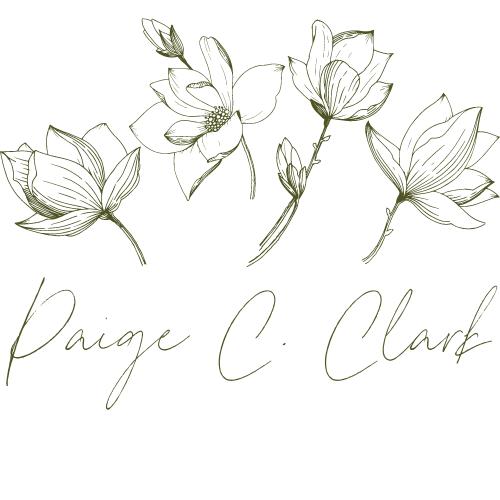This is a transcript from episode 5 of the 9 to 5 Faith Podcast with Paige C. Clark.
Share on Social




Start of Podcast
Paige C. Clark 00:36
This is Paige C. Clark and you’re listening to the 9 to 5 Faith podcast. Well, welcome Eden. I’m so glad to have you on the podcast. Happy Thursday, almost weekend. All good. So can you tell us a little bit about yourself and what you do? And yeah,
Eden Estabrook 00:57
absolutely. So I am in digital marketing. So my, I guess my, my education was actually in professional writing. And that kind of tossed me into the communications world. People always find it funny because I work in manufacturing now. But in college, I actually studied medieval studies as my minor. So it’s like I went from, I went from, like, archaic documentation to robotics. But like,
Paige C. Clark 01:24
Oh, cool. We’re gonna pause there. What were you gonna do with? Was it medieval history?
Eden Estabrook 01:32
Medieval Studies! Yeah, um, I have my original plan was to work for a year after college and then go for a PhD. And then I ended up loving the industry manufacturing, like so much that I just, I never left. So here I am. And I’m just like, That’s
Paige C. Clark 01:52
So cool, though. You were the first person I have ever met who study
Eden Estabrook 01:58
medieval stuff. Yeah, people find it pretty interesting, especially when they learn what industry and what sort of life you know, advanced technologies I work with. And you started and you studied what I’m like, Yeah, English with medieval studies. Anything that you put your mind to?
Paige C. Clark 02:13
Right? So you work in manufacturing in the digital marketing space?
Eden Estabrook 02:19
Yeah, yeah. I’m 26. So I’ve been in my career now for we’re coming out in over five years. I graduated a little bit early. So I consider myself in that awkward stage between I’m not quite a nine to five newbie, but I’m also not like a veteran. Yeah. I’m pretty good. I’m pretty established. But I’ve still got a lot of things to learn. So that’s why I always find my age is pretty helpful whenever talking about work, because I’m in that nice little middle ground.
Paige C. Clark 02:46
Right, right. Right around the quarter life crisis. So yeah,
Eden Estabrook 02:50
I mean, I’m coming up on that midlife crisis soon. So you
Paige C. Clark 02:54
know, the quarter life crisis? Have you heard of this? No. It’s like when you turn 25. It’s like you have half of a midlife crisis, where it’s like, oh, you have like an identity question. It’s like fresh out of college, you’re finding your surrounding like all of that. It’s called the quarter life crisis.
Eden Estabrook 03:16
Well, if I graduated early, then maybe I’ll just have mine a little bit later. So maybe it’s coming this
Paige C. Clark 03:21
year. That’s how it counts. Well, good luck with that. Oh, yeah. Here.
Eden Estabrook 03:25
I didn’t study math. Let’s just put that out there. So so.
Paige C. Clark 03:30
Well, fair enough. And talk to us a little bit about like, your faith and a little bit about your faith journey, whatever you want to share with that.
Eden Estabrook 03:42
Yeah, so the nutshell version, so I was raised in a Christian home, parents are first generation believers. So I grew up in church grew up in, you know, nursery, I did all the things or anyone is familiar with, you know, I just wanna say church culture. I did all the things. Alana is you know, Bible Quizzing. I mean, the whole idea, so I’ve done them all. Yeah, I went to Vacation Bible schools every summer. So it was very ingrained in my everyday life from a very young age. But as all teenagers or young adults, it can happen at different times for everybody. There eventually comes a point where you need to make your faith your own and not the faith that your parents you know, kept you in. During your, you know, your dependency years. You could say, and for me, that happened around 16 So right before I went off to college, I got I just kind of had my I’m gonna say like my moment of like, okay, am I going all in? Or am I going to time to just, you know, walk away because there was not without trials. Absolutely. And don’t get me wrong. I still struggle sometimes when you think through like you know especially when the when tough seasons are there you wonder like, Is God even real? And that that age that age range for me really kind of had to bring that into perspective on Okay, things are really rough right now is my answer to the solution going to be leaning into my faith and making my faith my own or abandoning it and kind of, you know, moving forward without it. And I went in the direction of embracing that I got baptized right before I went back to college, and then kind of, you know, the rest is the rest is history. I’m still here today. So,
Paige C. Clark 05:34
that’s awesome. And how long have you been in your current position at work? Or like with this company doing this thing?
Eden Estabrook 05:44
Technically a year, okay, I’ve worked with this company longer in other capacities, but I’ve worked in this particular position for almost a year now.
Paige C. Clark 05:54
Yeah, that’s awesome. And work from home.
Eden Estabrook 05:59
Mostly, our one of our plants is in Charlotte. So I drive down every so often. But, you know, nine times out of 10 You guys are gonna get to see my home office and my favorite cat posts are right behind me to motivate
Paige C. Clark 06:13
those sir yeah, this is take me back to those like book fairs in elementary school that like just buy those posters at my little lack that lackluster over here, which is like all white, but it’ll get a makeover soon. So I kind of like to start this by asking, what’s your typical week or day look like because I feel like it looks different, a little different for everyone. And how you integrate faith into that is also a little bit different.
Eden Estabrook 06:53
Yeah, um, so I’m type A, so I love things to be the same. And I strive for consistency in my day to day life. So with it being worked from home, you know, it’s wake up, make the treacherous journey from my bedroom, to my office, and start, start the day. I, you know, try to find time to work out as well. And then, within all that, you know, trying to find the time and, you know, to be honest, sometimes motivation for one on one with God, or, you know, because it’s, there’s so much there’s only so much time in the day and it’s like, I find as I move forward in my career, I found I had to wake up early and earlier to fit everything in. So, you know, I’m always the first to admit I’m never I’m not perfect, you know, there are days that I fix it sleep or I picked the gym or I picked something else over God. And that’s a that’s a process. But other than that is that is fairly consistent does work. And then the evenings are where, like, week, week, day trip activities are so like, I’m involved in a in a church, small group, that’s after hours. Anytime they do, like a church serving event, those are usually on the weekends, you know, sometimes after hours as well during the week, like if it’s a children’s event, like a festival or something. So those those randomized throughout the different weeks, but complex schedule to be honest with you. Well,
Paige C. Clark 08:35
well you were telling me before we hit record that you also have to wake up at some weird hours to to like talk to some international
Eden Estabrook 08:44
Yes, I work across all all time zones. It’s, it’s it’s it can be that can be a fun time. Normally they’ll they’re pretty good at flexing. So I tried to say I think the earliest I’ll be willing to wake up for a meeting is six o’clock, but that has to be like drastic, you know, we can’t find any other time.
Paige C. Clark 09:05
Right? Yeah, I actually we work with a team in Poland and one of my co workers who’s in America was like I’m just gonna pull an all nighter just to get a work session in with our Poland team. And I was like, more power to you buddy. Like I need my sleep.
Eden Estabrook 09:24
I yeah, I can’t do that often, but I will in a pit.
Paige C. Clark 09:29
Right right. So what does your one like? What do you do to make sure that like your one on one time with God happens?
Eden Estabrook 09:42
Yeah, and I think so. When it’s, I guess if you’re if you’ve been in the church, your idea of a one on one is probably the first picture that comes to your mind is someone sitting in an arm in arm chair with a Bible and like reading, you know, reading something with a cup of coffee. See. And I think that’s definitely one way of doing it. And that’s what I strive for. I think that’s where if you know, the study of God’s word is crucial. But, you know, as I found that to be hard to do all the time, for my for myself, especially since I do want to start the day, with God versus envy, you know, I’m more of a morning person than I’m a night person. So I know some people get around the whole waking up early by doing their Bible study at night, I tried it. I’m just my brain is too bogged down from everything that I did throughout the day to really do that. Yeah. So what I’ve tried, what I’ve been trying to explore is, you know, what does one on one time with God look like? And you know, I think that can be studied. And, you know, I’m in, you know, several Community Bible studies going through different books of the Bible. And so that aspect is very much there. But from a one on one perspective, that can be as much as you know, talking to God, while you’re frustrated with a co worker, or you know, like, you know, prayer is not, it’s cluesive, to stillness. I think that that should that prayer should have some still quiet moments. But there’s nothing in the rulebook that says I can, you know, chat with God about my day, while I’m getting dressed, or while I’m, you know, brushing my teeth or brushing my hair, you know, whatever it is. And so, especially as a young adult, there’s so many things that are that’s vying for your time. That’s one way that I’ve tried to incorporate that one on one time with the Lord throughout the day is, you know, just conversation.
Paige C. Clark 11:53
Yeah. Yeah. And I think like working from home as like, a different element to it, too, because like, depending on like, how much space you have, like, your bedroom might also be your office might also be you know, your workout gym might also, you know, yeah, do you wear different hats at your workspace, but like, your space also might wear different hats. And I think like, I don’t know, for me, I am type A, but like, I need like, a space to really commune with God in. And so like having my office at home? Yeah, it’s one of my spaces. So definitely froze it for a loop.
Eden Estabrook 12:42
Yes, it’s also and so I live with my sister. So we’re all we’re both adults, as well as my parents. So I have a very full house. And so sometimes, I think, the quietness, if I want something like that, then I’d have to ask you to go somewhere else to kind of I’ve gone to I’ve gone to coffee shops, or you know, just sometimes just to sit on one of their couches and walk right. And, you know, I’m also I can be sort of easily distracted. So as I’m reading something, I’ll think there’s something like that before, you know what I’ve somehow transition from, you know, the book of John two. Oh, what I’m doing in four weeks?
Paige C. Clark 13:23
Yes, yeah. Yes. To all of that. Just as a reminder, for those listening, we are all imperfect. Just we are alert. we all we all fail and fall short of the glory of um, yeah. So thinking about like, your work day? How? How does God kind of intersect or show up in like your regular work, whether it’s like with coworkers or with just how you treat people or, or what have you?
Eden Estabrook 13:58
Yeah, that’s interesting, I would say that the feedback that I’ve received on myself is that I’m an abnormally nice person. Which, and this has been throughout I think, I’ve been in four jobs since I graduated college. And a lot of them have always mentioned, I have a noticeable genuine love for people. Which is an interesting comment because I’m very introverted. So like, you know, I wouldn’t consider myself like, you know, I’m not a huge people person, you know, a long time like it’s but you know, from a, from the non religious standpoint that my coworkers come from, what I interpret that as what they’re seeing is, you know, God’s biggest commandment is to love others. And you know, and I fall short, like, you know, gossip is a real big problem in every company that I’ve worked at, and I’ve fallen into it just like everyone else. But even within the flaws overall, you know, when I talk to someone I try to remember, you know, that they’re still made in the image of God that, you know, they are loved by Him. And I should try my absolute hardest to see them the same way that God does. If I failed at it, you know, I know I have, but that is probably, I think the most noticeable thing that you can do when standing trying to stand out as a Christian is how you treat other people. Yeah, in the workplace.
Paige C. Clark 15:48
Yeah. And I mean, you hit the nail on the head, when it’s like, like, what they see in you as positivity or easy to get along with, or really kind person. Like, we know, we know as God, we know, Jesus. Like, we have this light. And I think that’s like, I think we as like a culture have, have more of a way of thinking, like, we have to say something or do something to, you know, show up for God. It’s like, no, like, that’s gonna show up whether he wants to or not like it is our job to be like the vessels and to be like, the easiest thing we can do is to like, be a nice person and treat people with kindness.
Eden Estabrook 16:44
Or you’d be amazed, like, what? People catch up on that, you know, you’re not even trying, right? And it’s just like, God’s God’s love can come through even if you’re not telling somebody or I’m not, I’m not walking through my office, Hey, God loves you, and He loves you. Like, I don’t, I don’t do that. Like, I don’t think I’ve even you know, I don’t even think I’ve mentioned my face. But what tends to happen, and what has happened in a lot of my different jobs is that they, my co workers will pick up on something, and then that usually spurs a conversation. Like, I think when I worked, like before my nine to five, when I work in fast, casual food to pay for right pay for my college, I had one coworker asked like, why don’t you swear, because I worked in the kitchen. So I, you know, there’s a, unfortunately, a lot of cursing in the restaurant business. And that and that, just that comment alone provided me an opportunity to talk about why, what, you know why I believe what, what comes out of my mouth matters. And, you know, that wasn’t even something that says I wasn’t I wasn’t trying to do anything. It was just how I acted because of what I believe about God carried over into, you know, was noticed, and then it eventually drove them crazy as to why it wasn’t changing. And then they just asked me so
Paige C. Clark 18:14
yeah, yeah. And I think too, like, there’s the, you know, we’re supposed to show Jesus and Jesus is kind of countercultural. And I think that makes people curious, when when we’re acting in a way that is probably different from the norm or from what the rest of the herd is doing. Right? Like, we kind of stand out in that way. And I think that I saw your really good example of like, standing out that way.
Eden Estabrook 18:44
Yeah, no, absolutely. Absolutely. And, you know, once again, I know you mentioned earlier, like, we all fall short, we’re all imperfect, like, right, you know, if my family was into this, they’d be like, Well, I happen to know that Eden was you know, made a mistake in this area, conversation on the phone and like, and it does happen like we’re not like I I got mad at I got mad at a at a situation, you know, last week and I, you know, probably didn’t deal with it as
Paige C. Clark 19:12
the yelling fight with Miko work. Yes. Like it happens. But also there’s forgiveness. Yeah, there’s forgiveness and also just like humaneness and all of that, I think like, I think it’s also a chance for, like Christians to show like, their humility in the situation of like, once they acknowledge that they are wrong and that like, there is forgiveness and like, we should seek forgiveness from others like that. There’s humility in that because it’s hard to go up to like a co worker and like, apologize, right? Like, it’s weird. Yeah, I always felt weird to like, I don’t know. Like guilt inducing, but it’s also like, it’s like here, here’s my here’s my weakness. Here’s my shame. I’m acknowledging it in front of you. Right?
Eden Estabrook 20:04
I know that’s a, that’s a very big deal. I feel like at least within my work culture very, you know, you show your best, your best self like I don’t, I don’t like to tell people when I’m having a bad week, or if I’m, you know, I’m struggling with, you know, something personally that might be spilling into, you know, my work day. And it’s not fun. But mean, as you mentioned, that sort of vulnerability is countercultural, and a good way of especially admitting wrong, which is something I’m horrible if I like to think I’m right all the time. But it’s really necessary, sometimes in a really good way of building trust with your co workers to
Paige C. Clark 20:46
Yeah, and I remember, oh, gosh, I remember I was in a meeting. And I was in a meeting with other non Christians, for as far as I know. And there was a situation where I had forgotten someone’s name, like someone I’d worked with, like, really frequently. I just like blanked out on their name. I was like, Oh, I’m sorry. Like, I totally, totally could not place his name. And this person kind of snapped back at me. It was like, like, you apologize too much. Don’t Don’t apologize. You know, this whole idea of like, women shouldn’t apologize. And I’m like, no, like, I am genuinely sorry that this person name, this person’s name has escaped me because like, I want this person to feel known and cared about and valued. And I want the other people even they weren’t even in the meeting. And I want the other people in the meeting to know that I know and care about this person. And part of that is remembering a name. And yeah, that’s like, Absolutely. That was one situation I like had forgotten about that. But like, you bringing that up, I was like, yeah, like, you know, just apologizing sometimes. And it doesn’t have to be a bad thing. And it’s okay to apologize. Even though some people say like, you don’t need to apologize, be unapologetic. Sometimes it’s okay to Yeah, it’s,
Eden Estabrook 22:15
well, I think what’s important there, I think you might have, like, you brought up a really good point of is, you know, I believe that that person has the best of intentions. Like he really, or he or she I don’t know. Yeah, I think you specified Yeah, I think she brought up a, you know, she was she has the best of intentions. And so like, Stop apologizing, like, it’s okay. But she’s looking at potentially through a different lens. And yeah, and we are I believers, and we need to also as we’re interacting, you know, looking at things through that, you know, biblical lens, you know, my dad had always told me that like scripture is kind of our, our benchmark for you know, whether a thing is something is, you know, is good or bad, like, what does the Bible say about it? You know, and so when you look at things through that lens, something as simple as like, you know, God loves the sparrows, why wouldn’t you want me to try and remember somebody’s net? Like, you look at things differently, yeah, things differently when you have that. That perspective?
Paige C. Clark 23:12
Yeah. Yeah. And, and you hit on something earlier that like, I want to come back to because it’s been something that’s been like, really heavy hitting for me, because like, I guess in like high school, I didn’t think that gossip would be a problem outside of like, teenage years. Like, I didn’t think that the worst gossip I would ever encounter would be in the workplace. So can you say like, something more about that? And like, I don’t know, how you combat it, or like how you kind of check yourself with that.
Eden Estabrook 23:49
So my rule is, do my absolute hardest to not say anything, that I wouldn’t tell that person I tend to be a little bit more bold in that area. So maybe I push the lines on that. But I am willing to tell ya, if the if the opportunity is provided, but it’s a really hard one, because it’s so ingrained in our culture, and this is not even this is not even at work. This is churches and everything. Yeah. Like gossip is a real problem. And I don’t think, you know, my generation at least gives it the, the I would say the respect it deserves as like, in a way like it
Paige C. Clark 24:41
is yeah, yeah.
Eden Estabrook 24:43
It is. It’s a you know, it’s it’s not stealing, you know, it’s not, you know, more drastic, that more drastic sounding of the of the sins, but I do believe that it’s wrong and It’s so it’s a really hard one how I said how I combat it is trying to, you know, check myself when I’m talking to people, and you know what I say to that person. But I fall short in this area quite a bit, because, you know, due to just within just within work politics getting information is very helpful. And
Paige C. Clark 25:22
yeah, and I think I think one of the lines, that that, that why gossip is so hard to not only define, but also to kind of constrain and put within boundaries is like, when you’re stealing something from the supermarket, you’re taking the piece of gum, and you’re leaving with it, right. Like, it’s very clear, like what’s happening where you hit on a good point of like office politics and like business and like staying in the loop and like, knowing what’s going on, where does that line blur? That’s a hard to exact question to answer.
Eden Estabrook 25:56
Exactly, exactly. It’s a and I don’t have the answer. I mean, if you do great, please. Anyone that’s listening and has the answer, right? Yeah, because it’s still one that I struggle with. Because if I’m not in the loop, then I’m going to fall major, like, out of scope with a lot of my projects. So it’s part of part of it is, you know, trying to handle productivity. But, you know, there, I do think that there are lines, and I don’t, and I think sometimes those lines move based on what that particular, you know, conversation or a piece of gossip is in reference to if it’s about a person versus like, you know, a project team or like, I don’t, I don’t know, like,
Paige C. Clark 26:45
I don’t know. Yeah, hopefully, hopefully, as like, we get more episodes under our belt will like be able to, like expand this topic a little bit more. Because, like, for me to where I’ve ran into gossip, and like you say, like, I’ve fallen, fallen into it, and have really struggled with it, in the past is, I guess, like, guarding myself against hurt. And against, like, manipulation. And a lot of that is like, done through gossip of like, knowing which people act certain ways or will take advantage of people certain ways. And, and just being on guard on that. And so like, that’s where I’ve been put in situations where I’m like, Yes, like, I need to know what’s going on. Because also, I want to protect myself, and I want to make sure I’m acting appropriately for the situation. And and not kind of have, have one have that attack on me in whatever way? Yeah,
Eden Estabrook 27:56
I mean, for me, it’s partially a control issue I have, you know, I think that control issues almost come side by side with Type A personalities. But I, like, for me, knowing the information allows me to work around it. Like if I’m trying to get something done. And you know, I’ve worked at a big company, I’ve worked at a little company, and I’ve learned each one, you have to, you know, navigate things differently to, to get your to get your job done. And so, I that information is in my head critical. But then there’s also like, at what point am I talking myself into something that I know is wrong? Like, am I trying to justify my behavior? In order to, you know, keep going with it? If it’s, you know, surely not, you know, not biblical. I don’t have an answer.
Paige C. Clark 28:43
I might need to know answers. Right? Yes, I agree. And also, I’m like thinking to myself, like Paige, you should probably do some more research on this. And I probably will. And I hope to have many people on like yourself who can speak to it because I, I just, I was really naive, entering the workforce, of how prevalent it was, like, Sure, don’t steal from your company. Right, like, treat people nicely. that’s those are all really good things. But also, like, where’s the line of gossip and like, and how we can show the love of God through our actions in avoiding gossip.
Eden Estabrook 29:31
Yeah, one thing that I’ve always been really fired up about is I’ve always felt the gap in almost like Christian education, is that transition from college to the workforce? Like there’s so different and then you’re you’re almost you’re not even prepared for once you enter it like, oh, my gosh, like, what? Just what happened to my look? Yeah, like, you know, being surprised about gossip like, Oh, you think that’s like the teenagers? You know, I feel like it almost gets worse with adults. Yeah.
Paige C. Clark 30:00
So oh, it absolutely, it absolutely does. I don’t think I dealt with this issue as much as I did in adulthood. By any factor.
Eden Estabrook 30:13
There are whole life Instagram channels at this point dedicated to like, how people talk about things professionally. And basically, you know, the whole life professional ways to say things. Right? There’s a whole there’s almost a language to be in business. And it’s like, it’s so if nobody told you what it was gonna be like, Well, they didn’t tell me at least say I was all over. But yeah, I mean, I graduated. And you know, all of a sudden, I went from like, Yeah, time during the workday to, oh, I have to be at the same place Monday through Friday, nine to five, and then even then nine to five was sort of a lie. Because then you had I was commuting at the time. Yeah.
Paige C. Clark 30:56
For clarity sake, I say nine to five, because that’s how most people recognize it. But like, no one works nine to five, it’s eight to five. Where
Eden Estabrook 31:06
was that? Notice? Yeah, it just saw totally happen. And I mean, I was always doing that to begin with, because I liked to be productive before people got in. But so I would always start just a little bit early, but then you just noticed all of a sudden, you know, coming in early, or they’re, you know, they’re doing their nine to five is not true. It’s more like, seven sets if you’re dry. That’s true to the city. Like I mean, it can take up a large chunk of your time. You know, yeah, it’s like, it’s crazy, like, oh, nine to five, just eight hours. No. And then it’s somehow in between all the driving and the work. And you have to somehow feed yourself like, I mean, how does that work? That one?
Paige C. Clark 31:55
Yeah, so very true. And like, yeah, no one, no one gives you a heads up that the happiness is coming down, down your way. No, so but if you’re listening to this podcast, take this as your official warning, if you haven’t entered the workforce yet. This is your official warning that this stuff does happen.
Eden Estabrook 32:17
Yeah, absolutely. And
Paige C. Clark 32:19
I was thinking about it to have like, we probably spend more time at work or with our co workers, then we do our actual family. Oh, yeah, I haven’t done the actual math on it. I’m a comms major like you, or I’m in comms like you. But yeah, I haven’t done the math on it. And I don’t know if I will. But like the amount, the sheer amount of time that we spend with our co workers, and it is kind of like a second family.
Eden Estabrook 32:52
Yeah, you spend a lot of time with them. And like, you’re where you work that does influence you, you know, those people have an influence on you. And I think that’s to me, as I kind of progressed in my career, and my faith is why the importance of being in a church community outside of work, like I know, it’s an as you know, I’m 26, like, I’ve talked to a lot of young professionals who are like, you know, after work, I want to lay on the couch, and I want to watch TV, and I said, I hear you, but it’s so important, it is so important, counterbalance all the people that you’re hearing and talking to on a day to day basis, with time with other believers who are struggling through the same things that you are, so you can encourage each other. And, you know, it is it is worth dragging yourself off the couch. And yes, sometimes you are going to drag yourself off the couch and complain the entire drive. Yeah, but it’s so important to prioritize that time with church community, or Christian community. You know, you’re not in a church, but I mean, I highly recommend being in a church. I think that’s not only biblical, but helpful for your
Paige C. Clark 34:01
soul. Right.
Eden Estabrook 34:06
Because, yeah, it’s, it’s hard, why working is hard, like, and you need those people in your life to, you know, encourage you and, you know, bounce things off of like, I had this happen at work, was this wrong? Like and then if you don’t know, then, you know, work through the problem together.
Paige C. Clark 34:25
Yeah, and I think too, like, it provides like a level of accountability. I feel like the more and more I am involved in and ingrained in my church and church community, like the more accountability I have, because even even when he returned to the volume, I’m like, okay, so I meet like, once on Sundays, and then like, if I have a small group, it’s like halfway in the week. Well, there’s there’s like, not a whole lot of time to get up to mischief and between there like it’s easier to Uh, it’s easier to, you know, kind of follow those straight and narrow when you’re constantly being surrounded by this community that can keep you accountable.
Eden Estabrook 35:11
Okay, yeah, I mean, God has blessed us with technology, ology, and that is a great way to keep in touch with your brothers and sisters in Christ throughout the week. I know everybody hates group chats, I hate them as well.
Paige C. Clark 35:22
I love them. Oh my gosh, I love group chats.
Eden Estabrook 35:27
I know a lot of people who used to add them to a group chat, and they immediately you know,
Paige C. Clark 35:32
I love group chats, there’s so much fun,
Eden Estabrook 35:35
they’re fantastic for like, you know, dropping a prayer requests throughout the week. Like, you know, telling, you’re telling your church family, like, Hey, I’m having a really tough time this week with work and y’all, you know, take a moment to stop and pray for me, and vice versa, seeing what other people are struggling with throughout the week. And, you know, sometimes you may be able to support them within that, you know, but you’re never going to know, I always tell people, I can’t help you, or offer help or anything if I don’t know what the problem is. Right? That’s So always, always, always good to try and stay not just in a church community but invades in a church community, throughout. I think that’s especially challenging for my generation where I’ve seen it, I’ve seen it with, you know, the graduating classes that have come after me, where they’re the biggest, the biggest enemy against the church right now, for my age range is the couch, honestly. There is there is time, I know there is there’s just they’re battling exhaustion or, you know, lack of motivation. And, I mean, that’s why I’m very passionate about emphasizing church community, because I think it has made a very big difference in sweeping me, so you know, still to still a Christian, still a Christian through, you know, four or five different different jobs where with questionable influences throughout the way, I would say my church community has a good reason for that, you know?
Paige C. Clark 37:17
Yeah, yeah, for sure. And I think to like, your church community, is a way of getting filled back up, when you’re pouring yourself out to your co workers and to, you know, your, your company and everything, like you’re, you’re not only like, from an energy and like an intention, but also like, spiritually, like, there, you might feel like work is a spiritual battle, and that, like, you have to actively fight against things, or you might feel like that your co workers are really, you know, I don’t wanna say troublesome, but like, are offering up situations that you don’t want to find yourself in and you’re having to actively fight against those or you’re just pouring yourself into some people who, you know, you think that can, you know, that God wants you to be in their life with and you’re constantly pouring yourself out in church community is your way of kind of getting filled back up to?
Eden Estabrook 38:23
Yeah, no, absolutely. Absolutely.
Paige C. Clark 38:26
So, Eden, I always like to finish with this question. What is one thing that our listeners could take away from this conversation and like implement in their life today? Of like, what we’re talking about? What is one thing that they can walk away with? They don’t have to I do this on every episode. So if you’re listening to every episode, choose one, but give them one to choose?
Eden Estabrook 38:54
Yeah, absolutely. I would give the same advice that my college pastor gave to me right before I went away to college, which was prioritize church on Sunday, and prioritize multigenerational interaction with other believers. He said, and I said, I can’t quite take credit for this. But honestly, it was one of the best things that I ever did in college and beyond. I still still practice it today. He said, You’re not going to really learn anything if you surround yourself by people who are, you know, basically struggling alongside you. You know, I’m with a bunch of people who are 26 We’re all going through the same things and nobody has the experience to help us get out of it. So prioritizing church on Sunday. It’s a good way to you know, obviously start start your work week off with some Jesus and hopefully refresh your soul for the potentially treacherous week ahead, but also, not isolating yourself. within, like, you know, you know, beyond professionals or I think that sort of interaction is great, but you know, find somebody younger and you know, mentor them, find somebody older and have them disciple you like, ya know, it’s church is a community, it should be a community. And if it’s not, then then I would question some things about that church, but the church should be something where you are walking alongside other people and doing why. together and helping each other helping bury each other’s burdens throughout the week. And I think that that would be my two part advice.
Paige C. Clark 40:41
I love it. I love eat. And thank you so much for joining us. This conversation was so good. And you have motivated me to go into my Bible and into the commentaries and do a lot more research.
Eden Estabrook 40:56
So where can people LinkedIn is probably the best point fine. Yeah, you Mr. Brooks. My picture I think looks like me. So there’s not a lot of Enos to what’s out there. But I’m located in Charlotte, North Carolina, if you need to verify the address the city, but that’s probably the best way. And feel free to message me on LinkedIn or, you know, connect and then message. I don’t know what regulations are around this between people anymore. But happy to happy to talk. I love meeting new people. So
Paige C. Clark 41:33
awesome. Even thank you so much for joining us, and we’ll catch you next time. Awesome. Thanks for joining us. If you liked what you were listening to make sure you subscribe and hit those five stars and we’ll catch you on the next episode.




